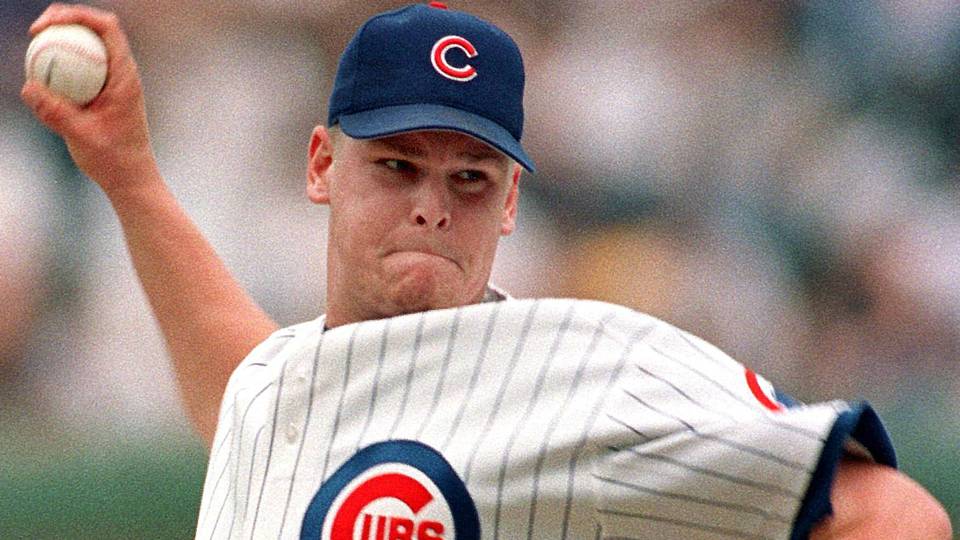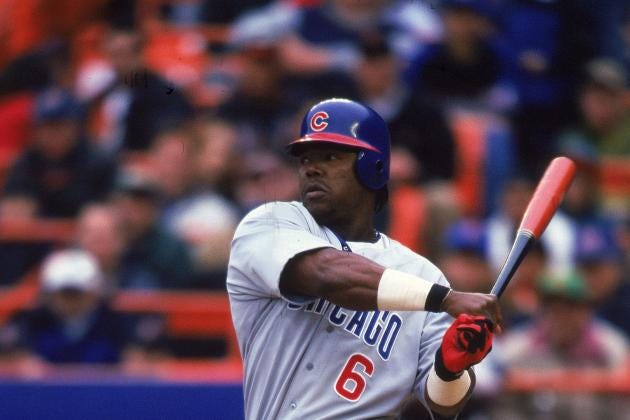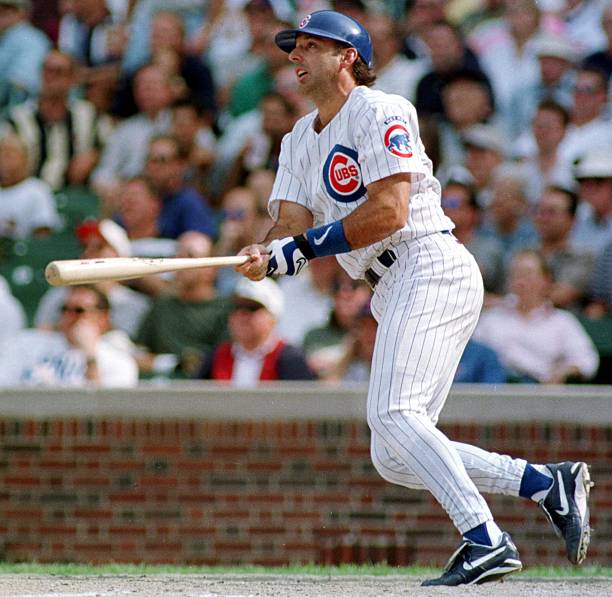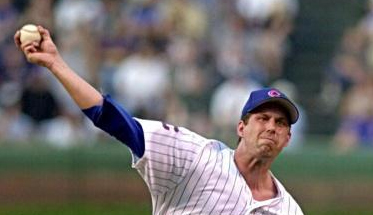1. Sammy Sosa
History has not been kind to Sammy Sosa, but if you even entertained the thought of somebody else taking the top spot, you are a moron of monumental proportions. Hell, if you have anything but unconditional love for Sosa's tenure with the Cubs, you are a mouth breather or part of the Ricketts family; I'm not sure which one is worse.
Sammy Sosa in 1998 was one of the most beloved baseball players of all time. Everybody was a fan of Sosa. I'm from Iowa, so my area is split between Cubs and Cardinals fans, and even the Cardinals fans liked Sosa that year. They wanted Sosa to fail horrifically he played the Cardinals, but it was still a lot of fun watching him that year. Sosa starting the game by sprinting out to right field was totally endearing, and we hadn't become as cynical about everything, so nobody would shit on him for those types of things until years later.
But let's rewind to figure out how we got to 1998.
Sosa was a promising prospect who made it to the big leagues at age 20. By his age 23 season, he had already been traded twice, first from the Texas Rangers to the White Sox, and then across town to the Cubs in exchange for George Bell. This would be a very good trade for the Cubs. Nobody really knew what they had in Sosa as he had always struggled at the top level and in 1992, his first year with the Cubs, those struggles continued. That would all change in 1993.
That was the year that he went from a player who had spent part of four seasons in the big leagues and never made a positive impact as he had a negative WAR every year from becoming only the 14th player in MLB history to have 30+ home runs and stolen bases in the same season. He likely would have had three straight 30/30 seasons, but 1994 was cut short due to a strike, so he missed that middle year between 1993 and 1995.
Sosa continued to be awesome for the Cubs, crushing bombs and attempting lots of steals, despite not having that great of a success rate. He had his first 40 home run season in 1996, although he did take a step back in 1997 as his OPS dropped over 100 points. It was possible that Sosa's career, much like baseball, could be dying a slow and painful death.
In people's memories, Sosa and McGwire were chasing Roger Maris throughout the entire season. For McGwire, this was true, as he started off on a red hot pace through the first couple months of the season. Sosa was a different story. On May 24, about two months into the season, he was sitting with a grand total of nine home runs. Nobody was screaming that he was only 52 from tying Roger Maris at this time.
Then Sosa got hot. And not just a regular hot, he went on an absolute tear.
He hit four more home runs at the end of May thanks to two multi-homer games and followed it up by hitting 20 home runs in the month of June. He only had 34 hits as his average actually dropped that month, but nobody was complaining since 20 of them left the yard, which is the most any player has hit in any month in the history of baseball.
That is when the chase was officially on. Sosa and McGwire went back and forth, and the world was abuzz about baseball. But even though McGwire won the battle in the end, Sosa seemed to win the bigger battle of public perception as where McGwire could be grumpy and a dick, Sosa was always smiling and exclaiming that baseball has been very good to him. Not just Cubs fans, but the entire world loved Sammy Sosa.
It helped that the Cubs were on their way to make their first postseason appearance in nearly a decade, so the Cubs had plenty to be happy about. But even with a phenom pitcher and Rod Beck closing out games, this year was all about Sosa, and deservedly so. Sosa and McGwire were tied at 66 home runs with two days left in the season. Sosa would go homerless, while McGwire would hit four home runs in those final games to win the home run title. Still, it was the year of Sosa as he would go on to win the MVP in 1998, finishing with a line of .308/..377/.647, hitting 66 home runs, with 134 runs scored and 158 RBI, the latter two both leading the league.
He would continue to be awesome. He hit 63 home runs the following year, followed by 50, followed by his performance in 2001 where he hit 64 home runs, and had a far superior year to 1998, providing 10.3 wins above replacement (He had 6.5 in 1998) with a line of .328/.437/.737. He still only came second in the MVP race, because some guy named Bonds hit 73 home runs. Oh, and it still wasn't enough for the Cubs to make the playoffs that year.
In my memory, he really started to struggle towards the end of his Cubs tenure, but that actually isn't the case. His last year was 2004, and he hit 35 home runs. He wasn't at his peak anymore, but he was good enough to be an All-Star that season, so the story of his demise was greatly exaggerated.
Instead, it was just silly bullshit that got people upset at Sosa. He got caught using a corked bat in 2003, and yeah, he probably shouldn't have done that, but nobody actually believed that the corked bat was the only thing getting him power in games. He went to the disabled list after sneezing too hard, and yeah, when I was young, I thought that was ridiculous, but then I got old, sneezed once, and definitely pulled a muscle in my back, so I get it. Then, he decided to sit the last game of the season and leave early, which also, isn't great, but I can understand if the guy was worn down. It's not good, but considering the joy that he brought people before that, I'm pretty sure we can let these minor issues slide since he is one of the greatest Cubs ever.
Now, he did pretty much suck ass for the Baltimore Orioles after being traded to them during the offseason. Then, he didn't play at all in 2006 since he was too proud to sign a minor league deal. But in 2007, he played again with the Rangers and hit 21 home runs with a line of .252/.311/.468, enough to help him reach 600 career home runs. I understand that doesn't light the world on fire, but it's not too shabby, especially for a 38-year-old. Unfortunately, that would be the end for Sosa. He still had one more power move as when he announced his retirement, he also said that he was looking forward to his induction in the Hall of Fame since his numbers made it obvious he deserved to be there.
He retired as a seven-time All-Star and one-time MVP, all of those accomplishments coming with the Cubs. He has not been inducted into the Hall of Fame despite being ninth all-time in home runs which is incredibly stupid.
Maybe the coolest thing about Sosa is that despite him being from the Dominican Republic, I can still claim him as a white guy, but that story is too weird for me to get into.
In case you missed it:
Introduction
#47 - Matt Karchner
#46 - Jose Nieves
#45 - Rodney Myers
#44 - Justin Speier
#43 - Tony Fossas
#42 - Kennie Steenstra
#41 - Chris Haney
#40 - Bob Patterson
#39 - Pedro Valdes
#38 - Derrick White
#37 - Ben Van Ryn
#36 - Terrell Lowery
#35 - Don Wengert
#34 - Kurt Miller
#33 - Jason Maxwell
#32 - Kevin Foster
#31 - Mike Morgan
#30 - Felix Heredia
#29 - Jeff Blauser
#28 - Jason Hardtke
#27 - Dave Stevens
#26 - Manny Alexander
#25 - Marc Pisciotta
#24 - Kevin Orie
#23 - Sandy Martinez
#22 - Terry Adams
#21 - Matt Mieske
#20 - Amaury Telemaco
#19 - Tyler Houston
#18 - Geremi Gonzalez
#17 - Orlando Merced
#16 - Scott Servais
#15 - Mark Clark
#14 - Lance Johnson
#13 - Brant Brown
#12 - Jose Hernandez
#11 - Steve Trachsel
#10 - Henry Rodriguez
#9 - Kevin Tapani
#8 - Mickey Morandini
#7 - Gary Gaetti
#6 - Rod Beck
#5 - Terry Mulholland
#4 - Glenallen Hill
#3 - Mark Grace
#2 - Kerry Wood
History has not been kind to Sammy Sosa, but if you even entertained the thought of somebody else taking the top spot, you are a moron of monumental proportions. Hell, if you have anything but unconditional love for Sosa's tenure with the Cubs, you are a mouth breather or part of the Ricketts family; I'm not sure which one is worse.
Sammy Sosa in 1998 was one of the most beloved baseball players of all time. Everybody was a fan of Sosa. I'm from Iowa, so my area is split between Cubs and Cardinals fans, and even the Cardinals fans liked Sosa that year. They wanted Sosa to fail horrifically he played the Cardinals, but it was still a lot of fun watching him that year. Sosa starting the game by sprinting out to right field was totally endearing, and we hadn't become as cynical about everything, so nobody would shit on him for those types of things until years later.
But let's rewind to figure out how we got to 1998.
Sosa was a promising prospect who made it to the big leagues at age 20. By his age 23 season, he had already been traded twice, first from the Texas Rangers to the White Sox, and then across town to the Cubs in exchange for George Bell. This would be a very good trade for the Cubs. Nobody really knew what they had in Sosa as he had always struggled at the top level and in 1992, his first year with the Cubs, those struggles continued. That would all change in 1993.
That was the year that he went from a player who had spent part of four seasons in the big leagues and never made a positive impact as he had a negative WAR every year from becoming only the 14th player in MLB history to have 30+ home runs and stolen bases in the same season. He likely would have had three straight 30/30 seasons, but 1994 was cut short due to a strike, so he missed that middle year between 1993 and 1995.
Sosa continued to be awesome for the Cubs, crushing bombs and attempting lots of steals, despite not having that great of a success rate. He had his first 40 home run season in 1996, although he did take a step back in 1997 as his OPS dropped over 100 points. It was possible that Sosa's career, much like baseball, could be dying a slow and painful death.
In people's memories, Sosa and McGwire were chasing Roger Maris throughout the entire season. For McGwire, this was true, as he started off on a red hot pace through the first couple months of the season. Sosa was a different story. On May 24, about two months into the season, he was sitting with a grand total of nine home runs. Nobody was screaming that he was only 52 from tying Roger Maris at this time.
Then Sosa got hot. And not just a regular hot, he went on an absolute tear.
He hit four more home runs at the end of May thanks to two multi-homer games and followed it up by hitting 20 home runs in the month of June. He only had 34 hits as his average actually dropped that month, but nobody was complaining since 20 of them left the yard, which is the most any player has hit in any month in the history of baseball.
That is when the chase was officially on. Sosa and McGwire went back and forth, and the world was abuzz about baseball. But even though McGwire won the battle in the end, Sosa seemed to win the bigger battle of public perception as where McGwire could be grumpy and a dick, Sosa was always smiling and exclaiming that baseball has been very good to him. Not just Cubs fans, but the entire world loved Sammy Sosa.
It helped that the Cubs were on their way to make their first postseason appearance in nearly a decade, so the Cubs had plenty to be happy about. But even with a phenom pitcher and Rod Beck closing out games, this year was all about Sosa, and deservedly so. Sosa and McGwire were tied at 66 home runs with two days left in the season. Sosa would go homerless, while McGwire would hit four home runs in those final games to win the home run title. Still, it was the year of Sosa as he would go on to win the MVP in 1998, finishing with a line of .308/..377/.647, hitting 66 home runs, with 134 runs scored and 158 RBI, the latter two both leading the league.
He would continue to be awesome. He hit 63 home runs the following year, followed by 50, followed by his performance in 2001 where he hit 64 home runs, and had a far superior year to 1998, providing 10.3 wins above replacement (He had 6.5 in 1998) with a line of .328/.437/.737. He still only came second in the MVP race, because some guy named Bonds hit 73 home runs. Oh, and it still wasn't enough for the Cubs to make the playoffs that year.
In my memory, he really started to struggle towards the end of his Cubs tenure, but that actually isn't the case. His last year was 2004, and he hit 35 home runs. He wasn't at his peak anymore, but he was good enough to be an All-Star that season, so the story of his demise was greatly exaggerated.
Instead, it was just silly bullshit that got people upset at Sosa. He got caught using a corked bat in 2003, and yeah, he probably shouldn't have done that, but nobody actually believed that the corked bat was the only thing getting him power in games. He went to the disabled list after sneezing too hard, and yeah, when I was young, I thought that was ridiculous, but then I got old, sneezed once, and definitely pulled a muscle in my back, so I get it. Then, he decided to sit the last game of the season and leave early, which also, isn't great, but I can understand if the guy was worn down. It's not good, but considering the joy that he brought people before that, I'm pretty sure we can let these minor issues slide since he is one of the greatest Cubs ever.
Now, he did pretty much suck ass for the Baltimore Orioles after being traded to them during the offseason. Then, he didn't play at all in 2006 since he was too proud to sign a minor league deal. But in 2007, he played again with the Rangers and hit 21 home runs with a line of .252/.311/.468, enough to help him reach 600 career home runs. I understand that doesn't light the world on fire, but it's not too shabby, especially for a 38-year-old. Unfortunately, that would be the end for Sosa. He still had one more power move as when he announced his retirement, he also said that he was looking forward to his induction in the Hall of Fame since his numbers made it obvious he deserved to be there.
He retired as a seven-time All-Star and one-time MVP, all of those accomplishments coming with the Cubs. He has not been inducted into the Hall of Fame despite being ninth all-time in home runs which is incredibly stupid.
Maybe the coolest thing about Sosa is that despite him being from the Dominican Republic, I can still claim him as a white guy, but that story is too weird for me to get into.
In case you missed it:
Introduction
#47 - Matt Karchner
#46 - Jose Nieves
#45 - Rodney Myers
#44 - Justin Speier
#43 - Tony Fossas
#42 - Kennie Steenstra
#41 - Chris Haney
#40 - Bob Patterson
#39 - Pedro Valdes
#38 - Derrick White
#37 - Ben Van Ryn
#36 - Terrell Lowery
#35 - Don Wengert
#34 - Kurt Miller
#33 - Jason Maxwell
#32 - Kevin Foster
#31 - Mike Morgan
#30 - Felix Heredia
#29 - Jeff Blauser
#28 - Jason Hardtke
#27 - Dave Stevens
#26 - Manny Alexander
#25 - Marc Pisciotta
#24 - Kevin Orie
#23 - Sandy Martinez
#22 - Terry Adams
#21 - Matt Mieske
#20 - Amaury Telemaco
#19 - Tyler Houston
#18 - Geremi Gonzalez
#17 - Orlando Merced
#16 - Scott Servais
#15 - Mark Clark
#14 - Lance Johnson
#13 - Brant Brown
#12 - Jose Hernandez
#11 - Steve Trachsel
#10 - Henry Rodriguez
#9 - Kevin Tapani
#8 - Mickey Morandini
#7 - Gary Gaetti
#6 - Rod Beck
#5 - Terry Mulholland
#4 - Glenallen Hill
#3 - Mark Grace
#2 - Kerry Wood














